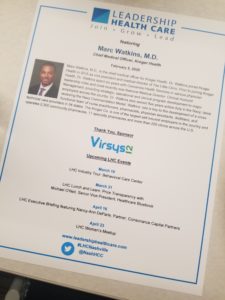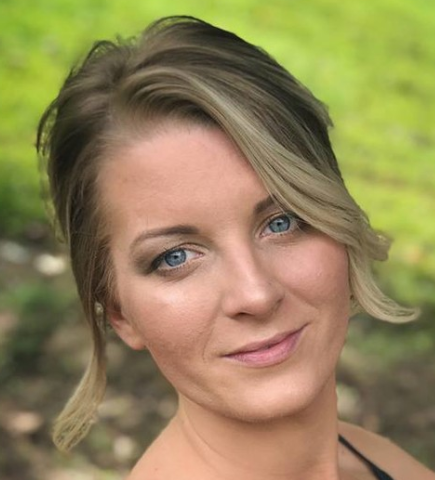 Last week, Virsys12 had the privilege of sponsoring the Nashville Healthcare Council’s February Leadership Healthcare Lunch & Learn event featuring Kroger’s Chief Medical Officer, Marc Watkins, M.D.
Last week, Virsys12 had the privilege of sponsoring the Nashville Healthcare Council’s February Leadership Healthcare Lunch & Learn event featuring Kroger’s Chief Medical Officer, Marc Watkins, M.D.
Dr. Watkins joined Kroger Health in 2015 as Vice President and Medical Director of The Little Clinic. Prior to joining Kroger Health, Dr. Watkins spent six years with Concentra Health Services in various physician leadership roles. Most recently, he was National Medical Director – Clinical Account Management, providing strategic, operational and clinical program development to major employers across the country. Watkins’ role at Kroger Health is key to the development of a cross-functional team of nurse practitioners, pharmacists, physician assistants, dietitians, and technical care providers in 34 states. Watkins joined us at the luncheon to share about the mission and work of Kroger as it relates to healthcare.
The Kroger company (to my surprise) is one of the largest self-insured employers in the country and operates 2,300 community pharmacies, 11 specialty pharmacies and more than 220 clinics across the U.S. Kroger introduced themselves into the pharmacy space 45 years ago, and they were introduced into store clinics 15 years ago. Since that time, they have been taking many steps to improve the health of their shoppers.
Kroger’s mission is to simplify healthcare by creating solutions that combine health, wellness and nutrition, and to connect with customers on an emotional and personal level. A huge driver for Kroger is the projection that half of America will be obese by 2030. Kroger is trying to do what they can to prevent this from happening. They would like to see a 20% improvement in obesity and have a goal of 18 million less people with obesity by 2025.
If you shop at Kroger, then chances are you have a Kroger rewards card. You swipe your card upon checkout, or enter the number associated with your card. We typically use the card for the savings associated with it, but the card also does allow Kroger to use that data for analytics and to help us to make healthier choices. Kroger has the belief that food is medicine. Their dedicated, educated staff can personalize approaches to eating and enjoying good food, and their customers can take steps to living a healthier life and to prevent illness before it even starts. By using our data, Kroger steers us in the right direction to making healthier choices, and they can determine the eating habits of a specific community.
Aside from data analytics, Kroger also has applications you can download to help with your shopping experience, and they gear these applications to help customers stay healthy by helping them with their food choices. Kroger’s OptUp app leverages your transaction data acquired over the past 20 years, as well as nutrition facts and ingredients lists of 170,000 different products, to determine “health” scores for individual items and shoppers. Kroger also has dietitians available through the app Telenutrition.
As you can see Kroger is taking many steps towards making a healthier America. I think they have the right resources available and the success as a company to really make a difference. I was glad to learn that such a large, longstanding company cares about its customers and wants to help create positive actions in their lives.
 Last week, Virsys12 had the privilege of sponsoring the Nashville Healthcare Council’s February Leadership Healthcare Lunch & Learn event featuring Kroger’s Chief Medical Officer, Marc Watkins, M.D.
Last week, Virsys12 had the privilege of sponsoring the Nashville Healthcare Council’s February Leadership Healthcare Lunch & Learn event featuring Kroger’s Chief Medical Officer, Marc Watkins, M.D.
Dr. Watkins joined Kroger Health in 2015 as Vice President and Medical Director of The Little Clinic. Prior to joining Kroger Health, Dr. Watkins spent six years with Concentra Health Services in various physician leadership roles. Most recently, he was National Medical Director – Clinical Account Management, providing strategic, operational and clinical program development to major employers across the country. Watkins’ role at Kroger Health is key to the development of a cross-functional team of nurse practitioners, pharmacists, physician assistants, dietitians, and technical care providers in 34 states. Watkins joined us at the luncheon to share about the mission and work of Kroger as it relates to healthcare.
The Kroger company (to my surprise) is one of the largest self-insured employers in the country and operates 2,300 community pharmacies, 11 specialty pharmacies and more than 220 clinics across the U.S. Kroger introduced themselves into the pharmacy space 45 years ago, and they were introduced into store clinics 15 years ago. Since that time, they have been taking many steps to improve the health of their shoppers.
Kroger’s mission is to simplify healthcare by creating solutions that combine health, wellness and nutrition, and to connect with customers on an emotional and personal level. A huge driver for Kroger is the projection that half of America will be obese by 2030. Kroger is trying to do what they can to prevent this from happening. They would like to see a 20% improvement in obesity and have a goal of 18 million less people with obesity by 2025.
If you shop at Kroger, then chances are you have a Kroger rewards card. You swipe your card upon checkout, or enter the number associated with your card. We typically use the card for the savings associated with it, but the card also does allow Kroger to use that data for analytics and to help us to make healthier choices. Kroger has the belief that food is medicine. Their dedicated, educated staff can personalize approaches to eating and enjoying good food, and their customers can take steps to living a healthier life and to prevent illness before it even starts. By using our data, Kroger steers us in the right direction to making healthier choices, and they can determine the eating habits of a specific community.
Aside from data analytics, Kroger also has applications you can download to help with your shopping experience, and they gear these applications to help customers stay healthy by helping them with their food choices. Kroger’s OptUp app leverages your transaction data acquired over the past 20 years, as well as nutrition facts and ingredients lists of 170,000 different products, to determine “health” scores for individual items and shoppers. Kroger also has dietitians available through the app Telenutrition.
As you can see Kroger is taking many steps towards making a healthier America. I think they have the right resources available and the success as a company to really make a difference. I was glad to learn that such a large, longstanding company cares about its customers and wants to help create positive actions in their lives.




